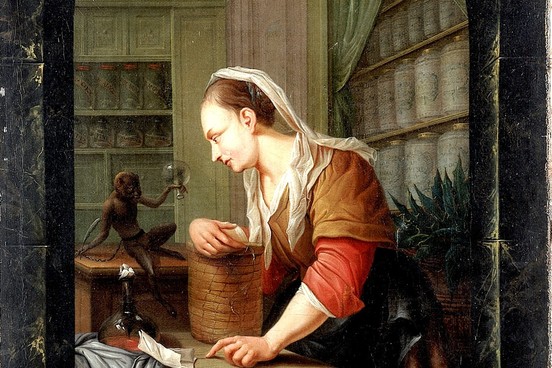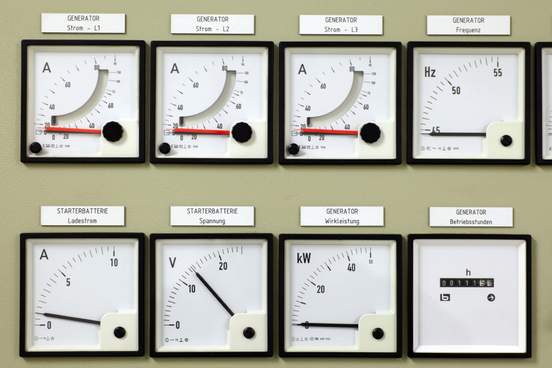
Avoirdupois Weight & the English System
We take for granted today that there are standard measures for time, area, distance, and volume, but these were once very different from place to place. A standard agreed-upon hour of the day wasn’t even implemented until the mid-1800s. The avoirdupois system often used objects for measuring things, and the English system commonly used the names of body parts, both resulting in the unusual and distinctly irregular names we still use today for lengths, depths, and weights.
Avoirdupois itself originally meant "goods sold by weight," but, in a semantic development that seems to nod to the English system, it has taken on a second, fleshly meaning over the centuries. Since the 1500s, avoirdupois has been used to mean "heaviness, especially personal weight."

Fathom
The depth of water is measured in fathoms, an ancient word that is as old as English itself: the Oxford English Dictionary includes an example of its use from 824. In Old English it meant “outstretched arms” or “embracing arms,” and came to have the figurative meaning of “comprehension” or “intellectual grasp,” which led to the more familiar verbal use of fathom, meaning “to understand the reason for” (as in “their motives were difficult to fathom”).
From “outstretched arms,” fathom came to mean “the distance between fingertips of a person’s outstretched arms,” and, conventionally, the distance of six feet for measuring the depth of water.

Cubit
The dimensions of Noah’s Ark were given in cubits, a long since disused unit of measure. Like most measures in the ancient world, the precise dimensions of it are not known but certainly were variable; the length of a cubit was based on the length of the forearm from the elbow to the tip of the middle finger, or about 18 inches. Here’s the passage from the Bible (Genesis 6:15) that describes the measurements for the Ark:
And this is the fashion which thou shalt make it of: The length of the ark shall be three hundred cubits, the breadth of it fifty cubits, and the height of it thirty cubits.
Cubit comes from the Latin word cubitum meaning, appropriately enough, “elbow.”

Scruple
A scruple is a small amount of something, and is used in the system of apothecaries’ weight used by pharmacists. In this system, the smallest unit is the grain, and a scruple is equivalent to 20 grains. As weights increase, a dram is 3 scruples, an ounce is 8 drams, and a pound is 12 ounces.
Scruple comes from the Latin word meaning “small sharp stone”; today's scruples weigh 1.296 grams. It has sometimes been used to mean “a minute quantity” or “iota,” as in this line from Shakespeare’s Measure for Measure:
Nature never lends the smallest scruple of her excellence…
The other kind of scruple, meaning “an ethical consideration,” has the same root. It developed as a metaphor meaning “a source of anxiety or uneasiness” from the idea that a sharp stone causes discomfort (for example, if it were in your shoe). Scrupulous, meaning “careful,” derived from this use of scruple.

Furlong
A furlong is a measure of distance used in horse racing to this day, but its origins lie in a different kind of race, one against time: how much land a yoke of oxen could plow before sunset. The old rough measure of an acre was the amount of land that could be plowed in a single day, an area considered to be 160 square rods (and a rod is an old unit of measure equal to 5 ½ yards). Since a plow makes furrows in a field, a furlong was the length of a side of a rectangular acre, or field. Its Old English roots are the ancestors of furrow + long.
Today, a furlong is standardized as 1/8 of a mile, or 220 yards or an area of 220 yards by 22 yards.

Dram
A dram is both a unit of weight and a measure of liquid capacity. In either case, it’s a small amount. Dram came from French through Latin and ultimately from the Greek word drachmē, meaning “handful.” As a unit of weight, a dram is 1/16 of an ounce (and an ounce is 1/16 of a pound). As a liquid measure, a dram is 1/8 of an ounce. No one said that this would be easy.
The smaller units that constitute drams are called, for weight and liquid respectively, grains and minims. There are 27.344 grains to a solid dram and 60 minims to a fluid dram.
Dram has come to mean, more broadly “a small amount” of anything, especially a small amount to drink.

Barn
Everybody knows that barns are big. We even use the expression “couldn’t hit a barn door” or “couldn’t hit the broad side of a barn” to say that a person can’t aim well.
During the laboratory research for the development of nuclear bombs in the 1940s, scientists needed a handy term for the measurement of the cross-section of the nucleus of an atom, the target of particle accelerators used to trigger explosions. This work was at a scale so small that there was no unit of measure to label it with.
It was also top secret. Their solution was barn, a word too common to sound very suspicious. It represents 10-24 square centimeters—a very small area indeed, but one that represented the intended target of likely direct hits on the moving particles that make up matter.
Since then, physicists have adopted the term and even added others based upon it, like nanobarn, kilobarn, and megabarn.

Firkin
A barrel is among the oldest units of measure, referring, predictably, to “the amount contained in a barrel.” Unlike other ancient vessels that today only refer to units of measure, like gallon and quart, barrel is still used today as the word for “a round usually wooden container with curved sides and flat ends.” A firkin is both the vessel and the measure equivalent to a quarter of a barrel—especially useful if you consider how much a full barrel of liquid must weigh (barrels of alcoholic beverages contain 31 gallons, and a gallon of water weighs more than 8 pounds).
Firkin comes from the Middle Dutch word vierdelkijn, which is a diminutive of “fourth.” Today it’s sometimes used as the name for a cask of beer. A word for a larger cask is kilderkin, which contains half a barrel.

Gallon
The older names of liquid measures began as the names of vessels that carried liquid. Gallon comes from the Medieval Latin word galeta, originally meaning “jug” or “pail.” Quart similarly referred to the container rather than a specific measure. Shakespeare mentions “sealed quarts,” used as official proof that the correct amount of liquid was present in the container, in The Taming of the Shrew. These are contrasted with everyday (unmeasured) containers:
Because she brought stone jugs and not sealed quarts.
Measuring is also behind the word pint, which comes from the Latin word pincta, meaning “painted,” from the use of a painted mark on a container that showed its capacity. Smaller than the pint is the now rare gill, from the Latin word for “water pot.” Smaller yet is the ounce, which comes from the Latin word unus, meaning “one,” which doesn’t make it easy to remember that an ounce is 1/16 of a pint, which is ½ of a quart which is ¼ of a gallon.

Quiz Time
Do you know these uncommon units of measurement? Learning them could enrich your life immeasurably. Take the Quiz >






